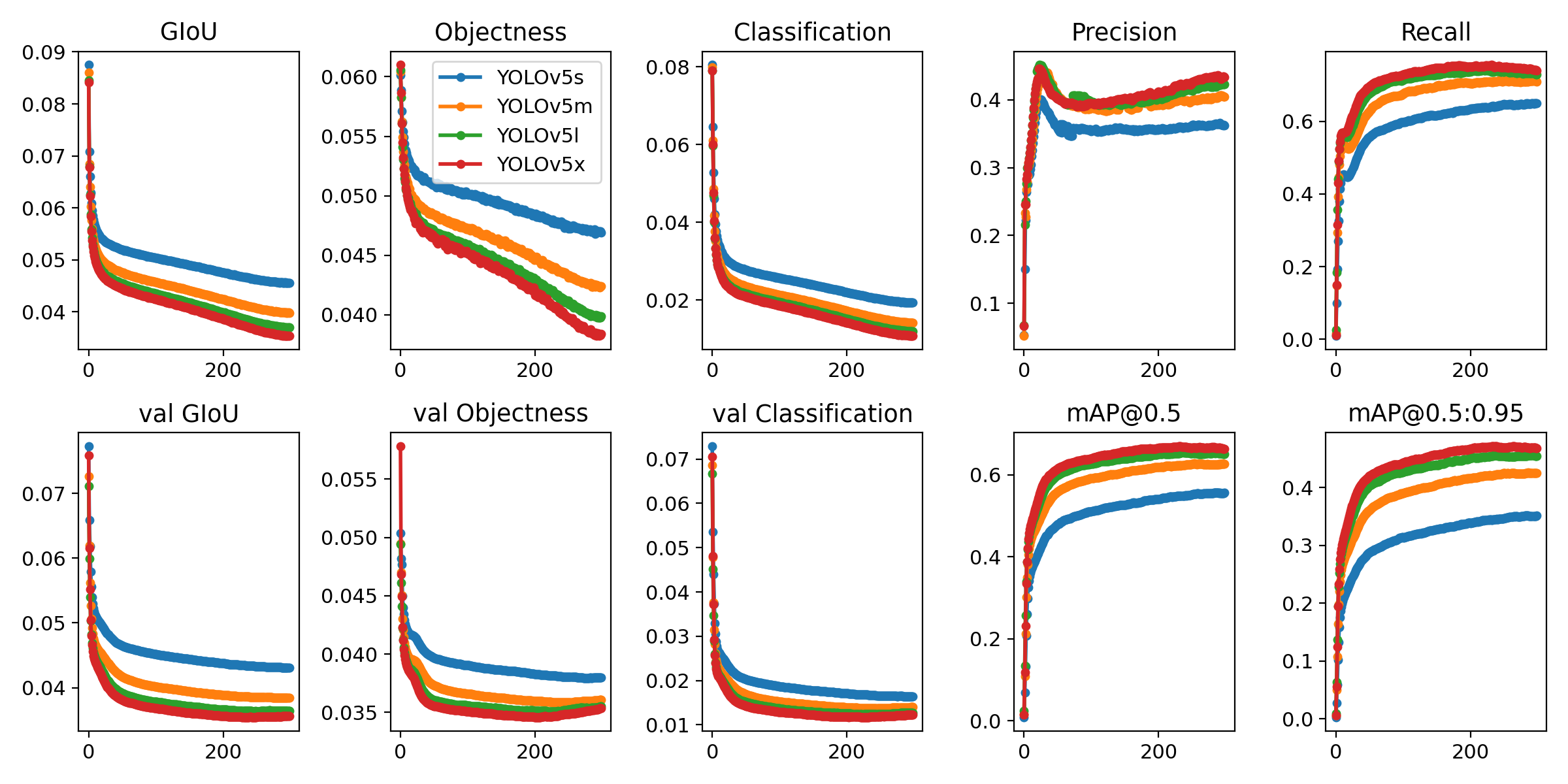Generalized-YOLOv5 is a modified version of YOLOv5. Two main contributions have been made to Generalized-YOLOv5. First, an extension to train on non-natural images and second a cross-validation extension.
Non-Natural image extension
The non-natural image extension enables YOLOv5 to handle images with arbitrary intensity scales, so it can be trained on 2D non-natural images. Furthermore, this extension also includes preprocessing scripts to convert non-natural image datasets to a natural intensity scale. Training on natural images is faster as OpenCV, which is highly optimized on natural images, can be used during training for preprocessing and augmentation. However, this can lead in some scenarios to a decreased performance as the intensity scale is often reduced to a fraction of its original scale. The slow-down on non-natural images can be somewhat mitigated by increasing worker threads (until they block each other), but one should expect an increased training time of 1.5x.
N-fold cross-validation
The cross-validation extension is a dataset preprocessing script that processes a dataset into N folds with corresponding dataset configuration files that are understood by YOLOv5. On each fold a YOLOv5 model can be trained and YOLOv5's built-in ensembling method can be used to run inference with the models of all folds. The built-in ensembling method itself has no cross-validation functionality and was only designed for ad-hoc ensembling of YOLOv5 models of different scales, thus the preprocessing script is required for cross-validation.
Documentation
See the documentation and usage of the Generalized-YOLOv5 in the Generalized-YOLOv5 README. The official YOLOv5 documentation can be found in the YOLOv5 README.
Quick Start Examples
Install
Clone repo and install requirements.txt in a Python>=3.7.0 environment, including PyTorch>=1.7.
git clone https://github.com/MIC-DKFZ/generalized_yolov5 # clone
cd yolov5
pip install -r requirements.txt # installInference
YOLOv5 PyTorch Hub inference. Models download automatically from the latest YOLOv5 release.
import torch
# Model
model = torch.hub.load('ultralytics/yolov5', 'yolov5s') # or yolov5n - yolov5x6, custom
# Images
img = 'https://ultralytics.com/images/zidane.jpg' # or file, Path, PIL, OpenCV, numpy, list
# Inference
results = model(img)
# Results
results.print() # or .show(), .save(), .crop(), .pandas(), etc.Inference with detect.py
detect.py runs inference on a variety of sources, downloading models automatically from
the latest YOLOv5 release and saving results to runs/detect.
python detect.py --source 0 # webcam
img.jpg # image
vid.mp4 # video
path/ # directory
'path/*.jpg' # glob
'https://youtu.be/Zgi9g1ksQHc' # YouTube
'rtsp://example.com/media.mp4' # RTSP, RTMP, HTTP streamTraining
The commands below reproduce YOLOv5 COCO
results. Models
and datasets download automatically from the latest
YOLOv5 release. Training times for YOLOv5n/s/m/l/x are
1/2/4/6/8 days on a V100 GPU (Multi-GPU times faster). Use the
largest --batch-size possible, or pass --batch-size -1 for
YOLOv5 AutoBatch. Batch sizes shown for V100-16GB.
python train.py --data coco.yaml --cfg yolov5n.yaml --weights '' --batch-size 128
yolov5s 64
yolov5m 40
yolov5l 24
yolov5x 16
Tutorials
- Train Custom Data 🚀 RECOMMENDED
- Tips for Best Training Results ☘️ RECOMMENDED
- Multi-GPU Training
- PyTorch Hub 🌟 NEW
- TFLite, ONNX, CoreML, TensorRT Export 🚀
- Test-Time Augmentation (TTA)
- Model Ensembling
- Model Pruning/Sparsity
- Hyperparameter Evolution
- Transfer Learning with Frozen Layers
- Architecture Summary 🌟 NEW
- Weights & Biases Logging
- Roboflow for Datasets, Labeling, and Active Learning 🌟 NEW
- ClearML Logging 🌟 NEW
- Deci Platform 🌟 NEW
Contact
For Generalized-YOLOv5 bugs and feature requests please visit GitHub Issues. For business inquiries or professional support requests please visit https://helmholtz-imaging.de/contact.




